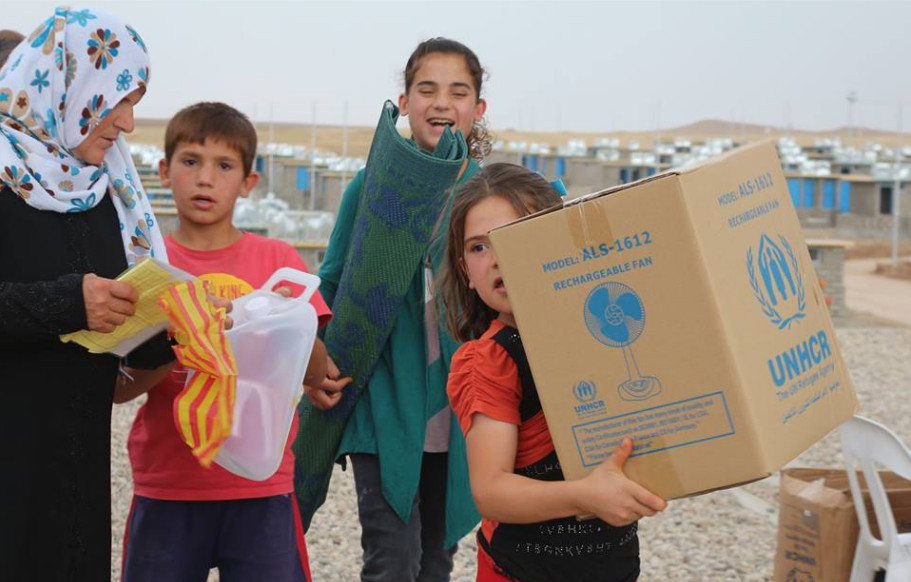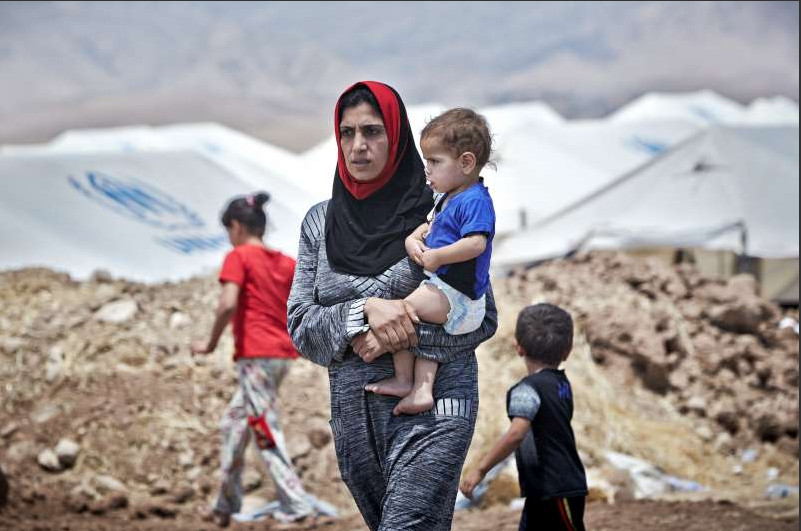The Dublin Barrister Leading the Refugee Response in Iraq
Over two decades, Grainne O’Hara has gone from assisting Guatemalan refugees return home to responding to the enormous refugee crisis in the Middle East.
Now the Deputy Director for UNHCR in Iraq, the Trinity College graduate talks to Anna Harvey about responding to the displacement of 2.9 million people inside Iraq, working in 40 degree desert heat and her longing for fresh, Irish milk.
How did you initially become involved with UNHCR?
I joined UNHCR in 1994. I was called to the Bar in 1992 and had been working in different capacities with the Free Legal Advice Centre (FLAC) in Dublin since 1985. With FLAC I gained a lot of experience with the social side of law working on issues like social welfare, labour and family law. I wanted to spread my wings a bit and gain some international experience and refugee law was a particular interest of mine. Ireland was a different place back then. There was no UNHCR office in Dublin and asylum-seekers were few and far between in the homogenous society that was Ireland in the mid-90s. I started applying to all sorts of NGOs like Concern and Voluntary Service Overseas.
At first I was disappointed to learn that there was not a lot of demand for a freshly minted Irish lawyer with few practical skills that would be of use to NGOs running large-scale professional operations overseas.
But then I hit upon the United Nations Volunteer scheme run at that time out of Bonn, Germany. I submitted my CV and got myself included on a UN-wide roster for agencies specifically looking for staff with a legal profile. And finally the call came from UNHCR to ask if I would be interested in joining their legal team in Mexico City. I took up my duties in May 1994 at a time when the eyes of the entire world were looking towards the Great Lakes and the massive refugee emergency spawned by the genocide in Rwanda. I ended up going westwards and found myself doing refugee status determination interviews in Mexico City.
You started working with UNHCR in Mexico and now you are the deputy representative for UNHCR in Iraq. How has your work evolved in the time between?
I learnt all the basics in Mexico. I stayed in Mexico City for two years and learnt a huge amount about two of the core activities of a UNHCR Protection Officer – status determination and resettlement. I was in and out of migration holding centres all over Mexico interviewing asylum-seekers from every corner of the world. And then the opportunity came up to move to Chiapas in the south of Mexico to work with the Guatemalan refugees who had been living in camps there since fleeing their homeland during the brutal civil war of the 80s. By the time I reached Comitan in mid- 1996, close to the Guatemalan border the deep south of Mexico, the Guatemalan peace process was coming to a satisfactory conclusion and with the signing of a comprehensive agreement in Oslo that same year the way was opened for sustainable voluntary return. And that is what I worked on for the next 3 years in a programme that assisted tens of thousands of Guatemalans to go home to collectively purchased farms and start their lives anew. Simultaneously we worked on the naturalization of tens of thousands more who decided to avail of the generosity of the Mexican government to stay on and locally integrate in the communities that had hosted them for close to two decades.
At the conclusion of my contract in Mexico I was deployed to the former Yugoslav Republic of Macedonia (fYROM) in one of the Emergency Response Teams activated for the Kosovo Emergency. There I saw the other end of the refugee life cycle working within a team that had to respond to the needs of hundreds of thousands of desperate civilians streaming out of Kosovo in the spring of 1999. But that conflict thankfully reached a quick conclusion and by summer we were working to help people return home. And I too made the journey to Kosovo in the winter of 1999 and stayed there for two years working with threatened minority communities. Then it was on to a four year stint at UNCHR HQ in Geneva where I took on the maritime portfolio in the Department of International Protection. I worked on everything to do with stowaways and rescue-at-sea and we made some progress with improvements in the international legal framework but as we see so shockingly with the crises in the Mediterranean and in South East Asia, the plight of refugees on the move at sea is far from being resolved. I later served in Burundi, Sudan (Darfur), the US, Syria and Afghanistan before being assigned to Baghdad in February of this year.
How does the Iraq mission compare with other emergencies/countries you worked in?
UNHCR is responding on two fronts here in Iraq. We have the Syrian refugee population numbering 250,000 who are mainly settled in the Kurdish Region of Iraq and at the same time the 2.8 million Internally Displaced Persons (IDPs) who are scattered all over the country. One of the biggest challenges here is the insecurity which severely limits the mobility of international staff like myself. It’s not so much of an issue for the team in the Kurdistan Region of Iraq (KR-I) who can get out daily and work in close proximity to the refugees and IDPs. Working from Baghdad is a different story but the limited mobility of international staff is not the defining feature of our operation as we have a dedicated and motivated team of Iraqi colleagues and a wide network of NGO partners who are out there day in day out working to ensure that the emergency shelter and household items stock is getting delivered to displaced people many of whom lost everything they own when they had to flee the advancing front lines of the conflict. There are some similarities with Afghanistan but the violence and resulting limitations on mobility is much more acute here and that adds a layer of complexity to the job.
What are the main priorities of UNHCR in Iraq? What is the biggest challenge currently? For example, how challenging is it to get humanitarian access to conflict zones?
It’s all about ensuring that we have access to the refugees and the displaced people and that they are able to receive the assistance that we can offer. The most visible manifestation of this is our role in building and sustaining camps and distributing tents and core relief items (blankets; cooking sets; fans; jerry cans). But lots of the people we are working to assist are not in camps. Those that have managed to find and hold down a job struggle to maintain their families in whatever rented accommodation they can find. Others have taken shelter in public buildings and unfinished construction sites or have been taken in by friends and relatives. And they too need our help.
After many years of Iraqi refugees fleeing to Syria, Syrians have now begun fleeing to Iraq. What particular challenges do they face compared to the Syrians who have fled to other countries such as Lebanon and Jordan?
Most of the Syrians currently hosted in Iraq are Kurdish and have been welcomed in the Kurdish Region where the local population and the authorities have been very generous in their support to the refugees. The comparatively healthy economy allowed many refugees to work and sustain their families with a minimum of assistance but unfortunately that is changing now as the Iraqi economy is buffeted by the downturn in global oil prices. The national capacity is additionally stretched by the mass displacement of Iraqi citizens which has been on-going since early 2014 and has now reached the shocking level of 2.9 million people displaced. Most recently with the mass exodus of civilians from Ramadi in Anbar Governorate which we have been mobilized in response to since early April.
Are women and girls particularly vulnerable?
Being uprooted and displaced from your home creates a vulnerability that affects everybody: men and women and boys and girls. But there is no denying that women and girls face some very specific risks. The levels of sexual violence experienced by some displaced Iraqis are almost beyond description. But they have been documented in all their horror by the UN and by numerous human rights activists who have highlighted the incredible suffering of minority communities like the Yazidi who have been particularly hard hit. Sexual violence is increasingly used as a weapon of war; a means to defeat and brutally humiliate anybody seen as an enemy. We have seen that in conflicts all across the globe from the Balkans to Congo and many other places. Iraq has seen the same with the brutalization of women and girls but also men and boys.
Aside from the direct threat of sexual violence of the conflict itself women and girls face a myriad of other problems. Early marriage and the pressure to work to help sustain the family draws many girls out of school cutting short their education and with it their prospects for a brighter future. For the numerous widows left to fend for their children it’s a challenge to find gainful employment in a society that does not necessarily offer that many opportunities to women in the workplace, especially those who lack educational qualifications and practical skills. Cash assistance programmes and vocational training programmes are a lifeline for single female headed household but with the limited funding available such programmes can only reach the most vulnerable amongst the huge number that need and deserve help.
77% of school age children are not enrolled in full time education in the region. Is there a danger that a whole generation of children will not get the opportunities that we take for granted here in Ireland?
The tragedy of this conflict for the lives of children is told in that single statistic. Children who have already suffered so much, who have lost family and friends and been traumatized by what the war has exposed them to are in desperate need of the stability and security that a return to school can offer and so many of them are not getting that.
It’s a challenge on many fronts with factors like overcrowded classrooms, underpaid or unpaid teachers, limited adaptation to languages and curricula that the children are accustomed to, all serving as barriers to getting more children into school. And then there is the additional harsh reality of parents simply not being able to afford to prioritize education with high dropout rates and lots of children working or begging on the streets to help sustain the family.
It’s not all bleak. A lot has been done by the national authorities around the region to increase the capacity of the educations system to support more refugee and displaced children. And UNICEF and many NGOs are at hand to help out with school supplies and other practical assistance. United Nations World Food Programme (WFP) places a lot of attention on school feeding programmes. This all helps but there is still a very long way to go before we are anywhere near to defending the right to an education that every child is entitled to.
You have worked all over the globe now, is there anything in particular you miss about Ireland?
It’s the little things you miss. Like the taste of real milk rather than that UHT stuff that passes for milk in so much of the world. Or the fresh feel of rain on your skin. From the soaring heights of 40+ centigrade here in Baghdad where a sandstorm can rip the tents to shreds leaving displaced people with nothing all over again you can’t help but wish that the generous rain allotment of home could be spread around a bit.



